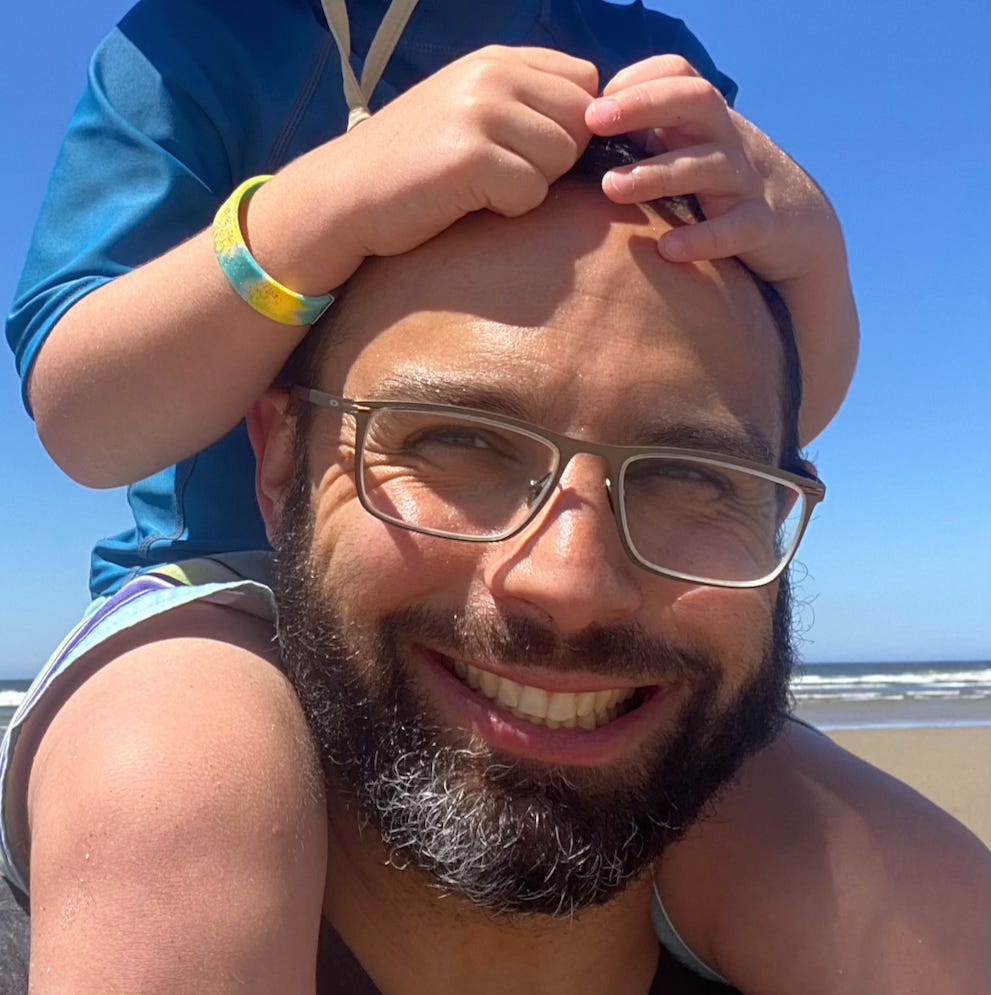With Father’s Day rolling in on June 15th, I wanted to feature a guest author who is a dad. And I thought, who do I know who is a dad and writes? And then I thought some more. Who could meet this role?
Oh yeah. I live with one. Below is a piece for Father’s Day from my husband and father to my children. In addition to those roles, my husband is a physician in the ICU, often encountering families on their most challenging days. After he leaves the hospital, navigating the care of the very sick, he arrives home and encounters challenges of a different sort, such as sibling brawls, children devastated over the wrong preparation of a sandwich, and new devotees to the “I won’t ever sleep again” model of living. These roles are never fully separate despite their very different appearances. And sometimes they intersect and inform in ways that the roles of care often do.
is a husband, father of four, and a practicing academic pulmonary and critical care physician. His clinical practice, teaching, leadership, and writing are inspired by the intersection of these identities. It is my great pleasure to welcome to A Wonderful Mess.Thank you, Ian, for joining us in the mess!
I drive into the garage, walk through the door to the kitchen, hang up my coat, and set down my briefcase on the bench in the front hallway. As I head upstairs, I hear the creak of the wood under my feet, and my wife reading to my oldest son, who is three. At the top of the stairs, I pause to listen to the comforting and familiar sound of their hushed voices. I then turn, open the door to my younger son’s room, and pick him up to kiss him goodnight. His small, warm body, arm reaching loosely around my neck and head nestled on my shoulder, soothes my soul after a long day in the intensive care unit.
I can feel my heart rate slowing as my sympathetic tone falls. I put the drowsy cherub down in his crib to sleep and move to the adjacent room to see my wife and older son. She has tucked him in to bed and his head peeks out from the covers. As I lean down to kiss him on the forehead, he says “I love you, Daddy,” and throws his arms around me. He cannot see the tears welling up in my eyes.

For the first time as a young attending physician, I nearly had to walk away from rounds earlier that morning, just outside your room.
You—like me, a young husband and father of two—are first on my rounding list, fighting for your life while you wait for a lung transplant. We hear about the overnight events and note a new fever and bandemia, worrying signs of infection despite the cocktail of powerful antibiotics that we hope will suppress the resistant bacteria brewing in your lungs. We need the drugs to keep working long enough to get you to transplant.
As we stand by your bedside discussing how best to adjust the ventilator and myriad infusions keeping you alive, into the room come your wife and twin boys. They look to be just older than my son, their blond hair matching the yellow contact precaution gowns they wear to fend off the multidrug resistant bacteria that are slowly killing you.
We step back to give them room to get closer to the bed and to you, their Daddy. Despite the deep sedation required to keep you comfortable on the ventilator, your arm moves faintly toward them, your fingers outstretched. You know your boys are there with you.
An ICU can seem oddly quiet, despite the hissing oxygen, rhythm of airflow in the ventilator, and beeping monitors. Your boys’ small voices break the air as they say, “I love you Daddy.”
I feel a deep pang in my chest and a lump form in my throat as I look away from you and your boys, making eye contact with your wife. The fellow summarizes the key components of the medical plan for the day. We ask whether your wife has questions; she does not. Her eyes communicate what we all know and nobody has to say out loud, “We really need lungs.”
Too often in the medical ICU, my job is to sit down with families to explain that despite our best efforts as an ICU team, their loved one is dying. I do not want—I cannot imagine—having that conversation with your wife. I will not allow myself to think about how, if our efforts do not succeed and we cannot get you to transplant, your boys will grow up without you. Staring into your room, I see myself in your bed, in your body. We are quite similar after all, sharing over 99 percent of our DNA sequence, with the notable exception that I am fortunate to have two functional copies of the gene encoding the CFTR protein.
Standing outside your room that morning, I do not know what the future holds. I do not know in that moment that you will in fact make it to transplant. I know only that you are sick, need lungs, and may not get them. I do not know how this story ends, and the uncertainty is excruciating.
Back in my house I pause, my head just above my son’s forehead. I respond in a broken voice with what I know you felt but heartbreakingly could not say back to your boys earlier that morning.
“Daddy loves you too, honey.”
After an illness of my own, I rediscovered my passion for medical narrative and found this piece, which I had written about Luke years previously. He received his lung transplant and was discharged home within a month of surgery, watching his boys grow in the years since. I reached out to him through my colleague, his transplant pulmonologist, and had the pleasure of talking to Luke on FaceTime, with his wife. I met one of their boys; they are now teenagers, and the other was busy with sports. Luke’s wife and I both recalled with crystal clarity the morning described above. Our video chat was one of the most unique and meaningful conversations of my career.
We all agreed during our meeting that Father’s Day would be the perfect occasion to share the story with the world.
Acknowledgement
I would like to thank Luke, his wife, and their boys, for their bravery and willingness to allow me to share this story. I would also like to thank Dr. Joseph Pilewski, Luke’s transplant pulmonologist and a clinical mentor to me, for his support and review of this piece.
To find out more about Ian’s work, you can find his website here. He writes a Substack, Reflections of an ICU Dad.






I’m not bawling at all. 😭
This gutted me in a good way. Thank you for this.